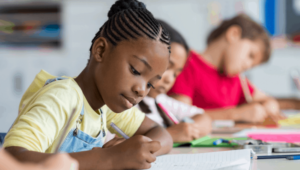Education Systems Should Be Based on How Students Develop

Turnaround for Children, an organization focused on “creating evidence-based tools that work in high-risk settings,” recently released a report that examines a growing body of research on student development and growth: Key Findings and Implications of the Science of Learning and Development. This report grew out of the work of the Science of Learning and Development (SoLD) initiative that partnered six broad-based stakeholder organizations. These organizations joined forces with the explicit intention of analyzing research results to inform and transform educational policy and practice for maximal life outcomes for students. The initiative focuses on today’s educational structures as they affect today’s students, to ensure that they are ready for the uncertainty of tomorrow’s world.
The experience of contemporary students is very different than it was fifty years ago, and the experience base learners bring to school is also very different than previous generations. Students process stimuli from mass media on a nearly constant basis, regularly interact with others geographically and culturally distant from their local community, and have access to technology-based tools for production and consumption once available only to specialized experts.
And, what we know about how students learn and grow has also seen rapid developments over the last several decades. A flowering of research from neuroscience, psychology, early childhood, and a variety of other disciplines on the science of learning and development has begun to shed light on what is necessary for students to reach our educational and societal ambitions. A number of independent research disciplines have matured into the emerging field of “Learning Science,” and school systems have yet to transition from a basis of tradition to evidence-based practice.
Many schools now provide a variety of paths to graduation, explicitly acknowledging the value of both academic and career preparation, and have increased inclusion of both cognitively and linguistically diverse populations. However, systemic change based on scientific findings on human development remains absent from the design of most educational reform efforts.
There are emerging pedagogical practices that are proving successful in graduating 21st-century-ready students, which upon examination, share a foundational set of understandings. Innovative practices including project-based learning, deeper learning, place-based learning, the utilization of a growth mindset, and the inclusion of social and emotional learning all reflect an underlying recognition that human development and community dynamics must be addressed to maximize achievement and life readiness. These efforts have been undertaken recently, and the results are promising; unfortunately, these initiatives tend to be small and scattered.
Systemic improvement will require that learning science insights provide the underpinnings to educational success at scale.
The Turnaround for Children report is based on two separate, complementary papers. One paper synthesizes research on what any individual needs for healthy internal development in body and mind. The second paper focuses on the role that external relationships and environmental factors play in how healthy development occurs. These papers produce a holistic response to the questions of which factors does science tell us impact human development and what structures can families and institutions establish to maximize health, adaptability and achievement. Their key findings highlight that the “nature versus nurture” divide must be reframed by understanding how nature and nurture influence each other over time and how significant development interruptions–trauma, deprivation of material and emotion, and incomprehensible loss–impact the developmental process (Turnaround’s CEO recently joined representatives from Digital Promise to dissect the findings in a webinar that can be viewed here).
Finding: Most Human Development is Rooted in Relationships
A major theme from the Turnaround for Children papers is that individual human development cannot be separated from the relationships the person has with others. There are significant developmental insights to be gleaned from the fact that humans individually develop within a web of complex social relationships. The first finding from the Turnaround for Children Key Findings document explains that “human development depends upon the ongoing, reciprocal relations between individuals’ genetics, biology, relationships, and cultural and contextual influences.” An unhealthy individual cannot form strong relationships with others, and systems in schools do not prioritize the establishment, maintenance, and healing of relationships during students’ developmental process.
This research notes that a lack of healthy relationships has a negative impact on an individual’s health. Thus, unhealthy individuals have more difficulty forming relationships. Those with negative, or lacking, relationships cannot remain healthy, subsequently forming a destructive, negative feedback loop which compromises development. A further finding states that “the human relationship is a primary process through which biological and contextual factors mutually reinforce each other.” Thus, for individuals and groups, there are multi-layered sets of dynamics and relationships.
The report recommends that schools provide “internal support structures” like counseling, and other community-based resources, to intervene in the negative spiral and produce an inflection point in life trajectory. Simply stated, “schools must take a whole child perspective and personalize learning in ways that take these factors into account.” It is this more holistic perspective with which schools must create systems to develop and educate individual students within group relationships. In a perfect world, these systems provide controlled risk, positive feedback on success, and supports for failures and maladaptive behaviors. But schools do not operate in that utopia, a reality that the report goes on to explore.
Finding: Trauma, Stress, and ACEs Change Life Paths
The research highlighted in the Turnaround for Children report explores the impact on development and relationships for children when risk, failure, or danger are the norm. The report affirms that trauma and other Adverse Childhood Experiences (ACEs) affect the life trajectory of students and builds on previous research by the Center for Disease Control. When students have no supports, either familial or institutional, the difficulties they experience are malignant rather than benign. In the absence of these supports, students do not have the internal or social resources to overcome the experience and the negative experience perpetually remains present as persistent adversity.
The report goes on to explain that “adversity, through the biological process of stress, exerts profound effects on development, behavior, learning, and health.” ACEs go beyond difficult days and major disappointments; trauma truncates growth and stress provokes the fight or flight mode.
The report declares that addressing the impacts of ACEs in schools will require “curricular designs and instructional strategies that support academic capacity, competence, efficacy, motivation, metacognitive skills, and mastery.” Detailed “principles of practice” are provided that are based in these Learning Sciences insights. A previous Getting Smart article highlights this need for a systemic approach to supporting students dealing with trauma. The report echoes these sentiments, and prescribes that schools embed social-emotional, academic, and relationship initiatives with the outcome metrics being healthy development. Health precedes attendance, attendance precedes engagement, and engagement precedes achievement. And healthy development, intra- and inter- personal, is necessary for individuals to have positive familial, social, political, economic, and any other relationships in a civil society based on equality, justice, and respect for diversity.
Early Adopters: Districts Incorporating This Understanding of Student Development
Our current education systems were not built with these Learning Sciences findings in mind. Schools and districts that are utilizing these insights to approach learning from a human development perspective are hampered by having to overlay these concepts on top of current systems. But we must nonetheless note that these are important undertakings, as they provide proof points for particular approaches which create a body of evidence for those educational institutions that will pioneer a fully developmentally-grounded school system.
- Austin ISD’s focus on Social Emotional Learning (SEL). The Austin Independent School District has partnered with Collaborative for Academic, Social, and Emotional Learning (CASEL) to deliver explicit instruction in SEL for 83,000 K-12 students. Incorporating SEL has become central to academic and school environment planning and the district has measured positive effects in improved attendance, decreased disciplinary action, and a positive correlation of teacher ratings of grade 3 students SEL competencies with performance on state reading and math assessments. The work has included outreach to families and has been sustained by a combination of district and community investment since 2011.
- Houston ISD’s Mindfulness Program: Houston Independent School District partnered with the Sonima Foundation (now called Pure Edge) to incorporate a health, wellness, and mindfulness program into the curriculum at more than 25 elementary, middle, and high schools, reaching 14,000 students. The expressed goal of the program is to reduce stress among students and promote overall student health and development. As part of the program, students participate in yoga, learn about healthy nutrition, and are taught strategies that help students be aware of their own feelings and reactions. Schools have seen improvements in attendance rates, a decrease in disciplinary issues, and academic benefits among participating students.
- Broward County, Florida’s focus on Personalization: Broward County Public Schools has implemented a research program called Personalization through Academic and Social Learning (PASL) for all of their more than 80,000 high school students. By combining data analytics (on behavior, attendance and course progression), a survey tool of all 9th graders (focused on self-efficacy, self-regulated learning, and teacher-student relationships), and regular meetings (of teachers and administrators), the district is committed to ensuring students create and maintain healthy connections with peers and adults.
Changing Praxis: Learning Sciences Research Must Drive Educational Practice
Because schools were initially designed without a scientific understanding of human development, their structure and practices neglect to support contemporary understandings of student growth. Schools, and especially those at the secondary level, are structured around all students achieving against a common norm. We must move beyond systems driven solely by outcome metrics that are snapshots of performance in knowledge and skills; rather our systems should be measured in their ability to support healthy development, build resiliency, and result in students successfully applying learning by both civic contribution and individual advancement. That’s not to say that we should not articulate a common floor of expectations for all students. But, in doing that, we must build systems that respect and incorporate the inherent diversity of individuals, groups, and relationships.
For more, see:
- Trauma, Stress, and Schools: Connecting the Dots between Science and Practice
- Key Findings and Implications of the Science of Learning and Development
- The Learning Sciences: Two Perspectives
- Learning Engineering: Merging Science and Data to Design Powerful Learning
- What The Learning Sciences Tell us about Competency Education
Stay in-the-know with all things EdTech and innovations in learning by signing up to receive our weekly newsletter, Smart Update.





Bankersway
Thank you for sharing your point of view on how education is they key to ones development. I appreciate your efforts and the thoughts are actual facts.